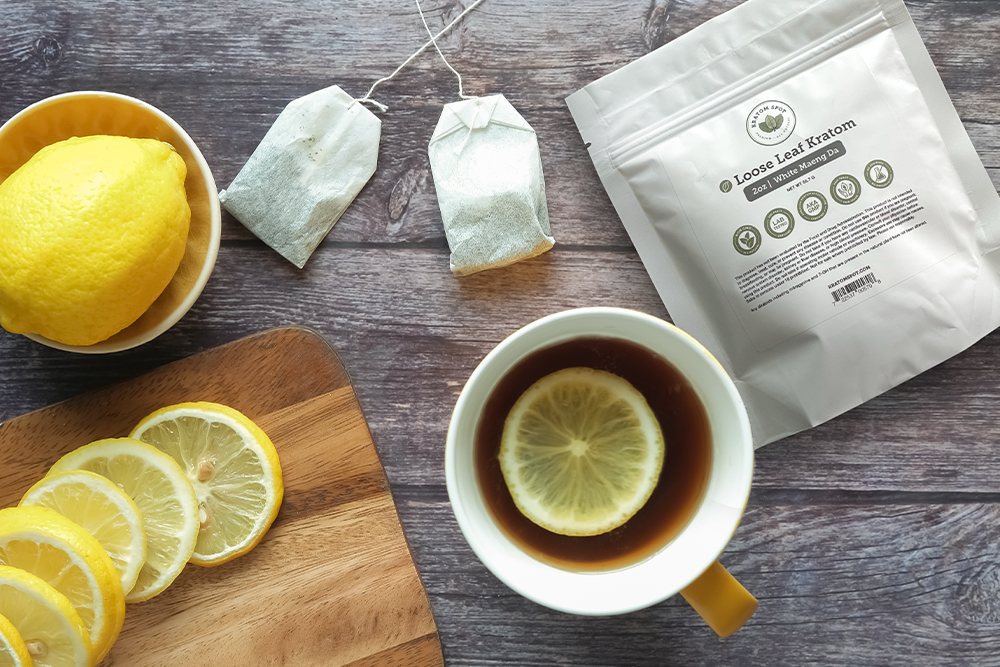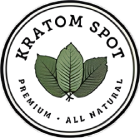
Pro Tips for the Perfect Kratom Tea Recipe
Making a cup of tea is fairly simple. But when it comes to kratom tea, there are a few non-obvious things you can do to up the quality of your cuppa.
From ideal temperatures to other ingredients and accessories, here’s what you should know before brewing your preferred kratom tea recipe.
Don’t Overheat Your Tea!
With most teas, bringing your water to a boil is just fine. But kratom tea is something of a special case.
Kratom is packed with alkaloids, natural compounds that are responsible for kratom’s unique effects. But, if you expose these alkaloids to high heat over an extended period, they can begin to break down. That means that your cup of kratom tea may be weaker than you intended!
To keep your kratom tea at optimal potency, avoid using boiling water. Instead, bring your water to a boil, then allow it to cool slightly and bring it to a simmer before adding your kratom powder or leaf.
Protect Your Alkaloids By Steeping With an Acid
Aside from controlling heat, using an acidic ingredient is the best way to protect the alkaloid content of your kratom tea.
Depending on the kratom tea recipe you’re using, consider adding a few teaspoons of a tasty acid such as:
- Lemon juice
- Lime juice
- Apple cider vinegar
These acids will insulate your kratom alkaloid content from breaking down due to heat. What’s more, they’ll also add a tasty twist that’s a perfect complement to most common tea recipes. It’s a win-win that really shouldn’t be skipped!
Kratom Powder vs. Leaf: Use the Right Accessories
Depending on the type of kratom product you’re using to brew your tea, you may benefit from using certain tools.
For instance, when brewing with kratom powder, it’s important to carefully strain any leftover powder before drinking your kratom tea. Using a French press is ideal for brewing with kratom powder.
By contrast, brewing with raw kratom leaf requires very little in the way of straining. However, you’ll still benefit from a few extra tools. Using a kratom tea infuser or sealable tea bags will prevent kratom leaves from getting in your tea and make cleanup easy.
For help on using these accessories, see our guide to using kratom tea bags.
Pick the Right Kratom Strain
Tea is versatile, and different brews are ideal for different purposes and times of day. Kratom tea is no exception, and your choice of kratom tea recipe will benefit from picking the right kratom strain.
- For energizing daytime teas, consider using an uplifting strain such as white kratom powder or most green kratom powders.
- For relaxing nighttime teas, a calming red vein strain may be preferable.
Once you know the purpose of your tea, you have a great base for any kratom tea recipe. What’s more, this choice may help determine what other ingredients (like a synergistic traditional tea) might help your recipe become a positively artisanal brew.
Pick Synergistic Flavors and Sweeteners
When properly prepared, kratom tea can be a delicious way to enjoy your regular kratom dose. But it’s not as simple as boiling raw kratom and guzzling the resulting brew down.
On its own, kratom tea can have a decidedly bitter, earthy taste that many (especially new) users find unpleasant.
The trick is to use tasty additives to complement and mask kratom’s distinctive flavor. Using traditional tea bags is one option, but we highly recommend experimenting with other additives, such as:
- Lemon or lime juice (also useful for protecting your alkaloid potency)
- Sweeteners like sugar, honey, or maple syrup
- Ginger
- Mint
- Basil
Ultimately, your taste preferences are king. If you enjoy the taste of raw kratom tea, then more power to you! But a bit of experimentation can result in a kratom tea recipe that appeals perfectly to your unique palate.
Great Kratom Tea Recipes
With all that said, you’re equipped with all the basics you’ll need to create the perfect kratom tea recipe. But, of course, there’s no reason you should need to reinvent the wheel!
The kratom community is full of great kratom tea recipes that you can use as a jumping-off point for your own custom creations. Here are a few of our favorites:
Basic Kratom Tea Recipe
This is a no-frills kratom tea recipe that serves as an ideal base for experimentation. Sure, it’s tasty enough on its own, but the real key is using this as a stepping-off point for your own kratom tea innovations!
Once you’ve got the basics of this recipe down, it’s time to get innovating. By spicing this basic recipe up with your own favorite ingredients, you’re on the right track for a delicious kratom tea recipe that’s all your own.
What You’ll Need:
- 2 or 3 cups of water
- ½ of a large, fresh lemon (you may substitute this for 2 – 2 ½ tablespoons lemon juice)
- Your preferred strain of kratom powder
- Something to strain the finished tea, such as a tea strainer or a coffee filter
- Optionally, sugar, honey, or another sweetener of your choice
Kratom Tea Brewing Instructions:
- Add the water to a saucepan, bring it just to a boil, then reduce to a simmer
- Squeeze the half lemon into the simmering water, or add the 2 – 2 ½ tablespoons lemon juice
- Ensure that the water is simmering and not boiling. Then, add your intended dose of red vein kratom powder
- Keep the tea mixture simmering for 10 to 15 minutes, stirring regularly
- Remove the sauce-pan from the heat source, then carefully strain the tea to remove the kratom sediment
- If you like, add sweetener to taste. Allow to cool briefly, then enjoy!
Minty Delicious Kratom Tea Recipe
If you’re looking for a flavorful twist that’s sure to please, then mint tea is an amazing complement to kratom’s earthy, distinctive taste. For this recipe, you can use either fresh mint leaves or your choice of traditional mint tea. Either way, this is a sure-fire way to make your kratom tea recipe an uplifting and delicious treat.
This is a simple recipe that’s easy to quickly throw together. The result is a thoroughly delightful cup that you’ll look forward to at any point throughout your day.
What You’ll Need:
- Red vein kratom powder
- 2-3 cups of water
- Fresh mint leaves or mint tea bags
- A sweetener of your choice, such as sugar, honey, or stevia
- ½ of a large, fresh lemon (you may substitute this for 2 – 2 ½ tablespoons lemon juice)
- Something to strain the finished tea, such as a tea strainer or a coffee filter
Kratom Tea Brewing Instructions:
- Add the water to a saucepan, bring it just to a boil, then reduce to a simmer
- Add your intended dose of red vein kratom into the water, then allow to simmer for 10-15 minutes
- Squeeze the half lemon into the simmering water, or add the 2 – 2 ½ tablespoons lemon juice
- Allow the tea to simmer for another 3 minutes
- Strain the tea into a cup, allow it to cool, then add sweetener to taste

